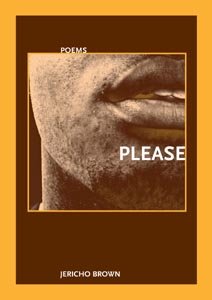Issue 3 - Spring 2010 Reviews American Fractal American Prophet Contents of a Mermaid's Purse Easy Marks Entrepôt Flinch of Song I Have to Go Back to 1994 and Kill a Girl In the Voice of a Minor Saint Sarah J. Sloat No Boundaries: Prose Poems by 24 American Poets Noose and Hook Please Self-Portrait with Crayon Some Weather The Best Canadian Poetry The Ravenous Audience Underlife Voices Interviews
 |
Please, Jericho Brown’s debut collection, plays like a mix tape of old standards, R & B, and a little rock ‘n’ roll. Every poem is a song, and every poem surprises: its imagery, its structure, its juxtapositions, its twists of language and rhythm. Although the work is deeply personal, never does Brown stray into the realm of self-pity. His words, his turns of phrase never relent. They speak with raw power; they cut to the core. In a 2009 interview with Open Source’s Christopher Lydon, Brown said, “I wanted to hit other people on the back with a belt, and make them like it, too.” Indeed, these poems live up to his wishes. Brown begins the collection with “Track 1: Lush Life:”
The title is taken from a Billy Strayhorn tune. Like all the singers Brown has chosen for his tape, Strayhorn is a tragic figure. His flame burned brightly and intensely and went out far too early. Like all the poems in this collection, its flame burns with the intensity of a tragic diva’s life. As Mark Doty states on the back cover, “Please explores the points in our lives at which love and violence intersect.” Throughout this poem, Brown juxtaposes love and violence: a woman singing to hurt, the voice as a whip, the term bitch as, “a term of endearment where you come from.” This juxtaposition is reinforced by the tension created through assonance and alliteration that weaves back and forth between soft and hard sounds, between song that lulls the listener and song that hits with a belt. The tension of the subject matter in mirrored in the tension of the beat. There is a constant tease of iambic rhythm in the lines mixed up with frequent stressed syllables to create a kind of syncopation like a snare drumbeat in the background of Brown’s song. The heavy beat is underscored by Brown’s use of pauses. Every line except the first and last is enjambed. This, combined with full stops in the middle of the lines, creates a breathiness to the work, like a singer performing a slow tune in a dark nightclub. Every poem in Please is a track in Brown’s tape. His work is filled with repetition, like the refrain of a song. He grew up in a strongly religious southern family, and the call and response of the church is evident in his lines. In “Track 1: Lush Life,” leather belt and lover’s tongue form the refrain, each phrase repeated three times. Sing is repeated four times. The repetition combined with his frequent use of rhymes and slant-rhymes creates not only a musicality but as in “Prayer of the Backhanded,” a sense of prayer in the lines:
Again the surprise of the unexpected line break creates a sonorous, heavily accented rhythm. The same technique appears in “Autobiography:”
In this poem, the song is created by the constant switch between a staccato beat, as in the first four lines, and the conversational flow of the following two lines. Brown’s work is filled with the unexpected beat or line break, with images that backhand out of the blue. His poems are raw and fresh, alive with the pulse of both love and violence. The collection is organized in four sections, Repeat, Pause, Power, and Stop. I picture not a fancy digital CD machine but an old tape player, buttons worn from constant use, tape looping and looping as the poems in Please loop and often come full circle. Repeat is filled with reflections from childhood and with the inevitable imprint childhood leaves on the present. With the constant interweaving of childhood and the present, Brown seems to be saying that we are condemned to repeat the patterns of our childhood in our present relationships. In “Track Three: (Back down) Memory Lane,” Brown reminisces about nights spent at his grandmother’s house:
The title is taken from a Minnie Riperton song, and the sweet tremble of her voice plays in the background of every line of the poem just as music seems to be constantly playing in the background of Brown’s life.
The poem is filled with a sense of loss. His childhood neighborhood has been lost to crack and violence. Minnie Riperton was lost to breast cancer when she was 31. At the end of the poem we learn that Brown’s grandmother, too, will die of breast cancer, the memory he writes about taking place in the years, “Before surgeons slice her/In vain, and we drive/Away, our car stereos/Playing rhythm and blues.” By keeping the poem in the past, with the future seen only as a vision in the last few lines, Brown makes the loss all the more powerful, another backhand out of the blue. The prescience comes as, “Involuntary, fast, but brutal/In its bruising,” as Brown says of his father’s strikes in “Prayer of the Backhand.” In Scarecrow, a persona poem written in the voice of the scarecrow in The Wizard of Oz, Brown deals with being black in a white world:
The nod here is clearly to Abel Meeropol’s song “Strange Fruit,” made famous by Billie Holiday. In a later section of the poem, On Graduate School, Brown writes, “A building in which I am mistaken/For a broom, handled as such,/And given to the floor. To dust.” The double entendre of the word “dust,” pairing the biblical with a janitorial task, took my breath. He ends the poem with a line that echoes T.S. Eliot’s “The Hollow Men” which begins,“We are the hollow men/We are the stuffed men/Leaning together/Headpiece filled with straw.” Then, in the last two lines, he circles back to “Strange Fruit”:
Hands are a frequent symbol in Brown’s poetry: the backhand of his father on his cheek, the hands of love or lust laid on a body, hands that murder and that embrace. In Pause, the poems deal with relationships, with failed and lost love. They speak of anger, love, and lust with brutal honesty. Brown said in his Open Source interview that he was interested in, “the music that was playing in the background while history is being made.” But his poems do not stay in the background. They jump out from the page. They burn skin. In “Crickets,” a persona poem in which he speaks in the voice of crickets, he says:
The poem takes place in the moment of silence after the glass of wine shatters, after the man has faded into the distance. Loss has not yet settled; it is still caught in the crickets’ chorus. The crickets say, “there is no such thing as background music,” and in all Brown’s poems this is true. Brown’s poetry and the singers he chooses to belt out his lines combine to make—as he puts it—“bigger and broader statements” about about personal history and global levels. The last section of poems is entitled Power. Whereas in Pause, many of the poems feel like laments written from a place of powerlessness, the love poems in Power are often playfully wicked and vengeful. In “David,” Brown contemplates revenge:
Clearly, he is no longer the man standing barefoot in a field of glass splinters, watching in silence as his man leaves. Here, Brown has the power; he is breaking the glass. It is in this section, too, that Brown allows himself to express the tenderness and love he feels for his father despite their violent story. “My parents Snoring” describes just that:
This poem is a lullaby of tenderness, compassion and nostalgia, “A dirge for callused hands/At rest” that ends with the plea, “May they never dream of scrubbing.” The hands in this poem belong to a man and woman who have spent their lives toiling, predominantly for others. The poem is a son’s prayer that his parents find in sleep a moment of rest and peace. Just as a ghazal ends with a line in which the poet is named, so Brown ends Please with a poem entitled “Because My Name Is Jericho.” It is a poem of affirmation, of power. He describes his voice:
And Brown’s poems do speak from a place of resonance born from the bell of his struck body. But as brutal as his work is, he does not leave the reader on the floor, gasping for breath. He ends the poem and the collection on a note of uplift:
From divas to crickets to his parents’ snores, everything sings in Brown’s lines, and each of his poems opens a door into this world of music. The final section of the book is called Stop, the “liner notes” for the songs in this mix tape. These notes speak of the tumultuous and tragic stories of the singers Brown has chosen to write about as well as the tumultuous times in which the songs were born. In his interview, he told Christopher Lydon that he admired divas for the, “vulnerability and confidence that go hand in hand.” I can think of no more apt description of Brown’s work in this stunning book. Reviewed by Naomi Benaron. |
